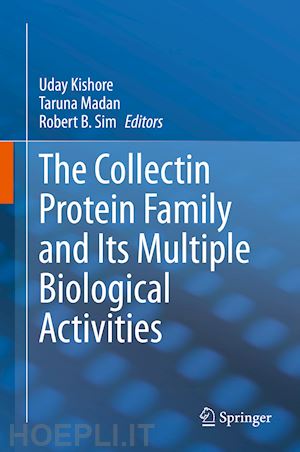
Questo prodotto usufruisce delle SPEDIZIONI GRATIS
selezionando l'opzione Corriere Veloce in fase di ordine.
Pagabile anche con Carta della cultura giovani e del merito, 18App Bonus Cultura e Carta del Docente
The topic of this book, Collectins, is a family of proteins whose major function is in innate immunity, where Collectins act as pattern recognition receptors (PRRs). In general they recognize targets such as microbial surfaces and apoptotic cells, and once bound to a target, Collectins promote the clearance of microorganisms and damaged host tissue. New cell-surface proteins and glycoproteins, which act as Collectin receptors, are currently being identified. Some Collectins, particularly MBL, activate the complement system, which enhances the ability of antibodies to fight pathogens, via three MBL-associated proteases, the MASPs. Additionally, recent research has begun to show wider-ranging activities of Collectins, such as:
· Their role in metabolism, and therefore their involvement in lifestyle diseases such as obesity and cardiovascular disease.
· Their ability to modulate the adaptive immune response, as well as to recognize and trigger apoptosis of cancer cells, which makes them effective in the annihilation of cancer cells with multiple mutations.
· The regulation of their expression by gonadal steroid hormones implicates them with critical roles in both male and female fertility.· Altered levels of Collectins have been associated with various autoimmune diseases.
This book brings together current knowledge of the structure, functions and biological activities of Collectins, to describe their integral role in human health.
Uday Kishore is a teacher and a scientist with special interest in innate immunity. He was the Founder Director of the Centre for Infection, Immunity and Disease Mechanisms, Brunel University London. He earned his BSc from S. P. Jain College, Sasaram, Bihar; MSc from Hindu College, Delhi; and PhD from the Department of Zoology, University of Delhi and CSIR Institute of Genomics and Integrative Biology, Delhi, India. After spending a year at the Salk Institute for Biological Studies, La Jolla, California as a NASA Fellow, he moved to the University of Oxford for the most part of his post-doctoral training, first at the MRC Immunochemistry Unit, Department of Biochemistry and then at the Weatherall Institute of Molecular Medicine, John Radcliffe Hospital. His previous positions include NASA fellow, Wellcome Trust International Fellow and Alexander Humboldt fellow. He is also the recipient of MRC Investigator Prize, European Commission Young Scientist Prize, and Mother Teresa Excellence Award. Dr Kishore has several adjunct and professorial positions internationally. He has authored nearly 200 research manuscripts, several book chapters, patents, and books. His research aims to understand how the innate immune components deal with self, non-self and altered self. His team is examining the roles of complement proteins and C-type lectins (including collectins) in host-pathogen interaction, cancer, allergy, and pregnancy.
Robert B. Sim has now retired from posts at the Medical Research Council (UK) (MRC Immunochemistry Unit, Department of Biochemistry, Oxford University), Professor of immunology at Kingston University, UK, senior researcher at Department of Pharmacology, Oxford University, and Honorary Professor at University of Leicester, Department of Infection, Immunity and Inflammation. He studied Biochemistry (BSc) at the University of Edinburgh, and received his D. Phil (PhD) in Immunochemistry from the University of Oxford, MRC Immunochemistry Unit, Department of Biochemistry. He was an MRC/INSERM Research Fellow at Centre d’Etudes Nucleaires in Grenoble, then returned to Oxford as a group leader in the MRC Immunochemistry Unit. His research interests are focused on the structure and functions of complement and other innate immune system proteins, and their interactions with microorganisms, altered host cells and macromolecules, and with synthetic materials. With more than 500 publications, Prof Sim is considered a pioneer figure in the field of complement and collectin research.
Taruna Madan has immensely contributed to the biomedical research on human Collectins and deciphered their relevance in host defence, cancer surveillance and reproductive health. She established the therapeutic potential of collectins viz. SP-A, SP-D and MBL against the fungal pathogen, Aspergillus fumigatus. Discovery of a direct anti-cancer role of SP-D by her team in leukemic and breast cancer cells via p53 and HMGA1 was subsequently validated by other groups using pancreatic, prostate and ovarian tumor cells. With an aim to develop a vaginal microbicide for HIV-1, she established the potent and broad-spectrum anti-HIV-1 activity of SP-D and elucidated SP-D-mediated reversal of HIV-1-induced pro-inflammatory gene signature. Taking cues from the significance of immunoregulation in pregnancy and male fertility, she demonstrated critical roles of collectins in the embryo implantation, placental development, preeclampsia and spermatogenesis. Clinical studies by her group in HIV-1 sero-discordants, preeclamptic women and infertile men have endorsed the translational potential of SP-D. She has authored over 100 research publications, and 9 granted patents (Google scholar citations 3600, h-index 27 and i10 index 54). Dr Madan has several national and international collaborations, including with Brunel University London, MRC Immunochemistry Unit, Oxford, Wythenshawe Hospital, Manchester, Brigham and Women’s Hospital, Boston, USA, and Pasteur Institut, Paris, France.











Il sito utilizza cookie ed altri strumenti di tracciamento che raccolgono informazioni dal dispositivo dell’utente. Oltre ai cookie tecnici ed analitici aggregati, strettamente necessari per il funzionamento di questo sito web, previo consenso dell’utente possono essere installati cookie di profilazione e marketing e cookie dei social media. Cliccando su “Accetto tutti i cookie” saranno attivate tutte le categorie di cookie. Per accettare solo deterninate categorie di cookie, cliccare invece su “Impostazioni cookie”. Chiudendo il banner o continuando a navigare saranno installati solo cookie tecnici. Per maggiori dettagli, consultare la Cookie Policy.